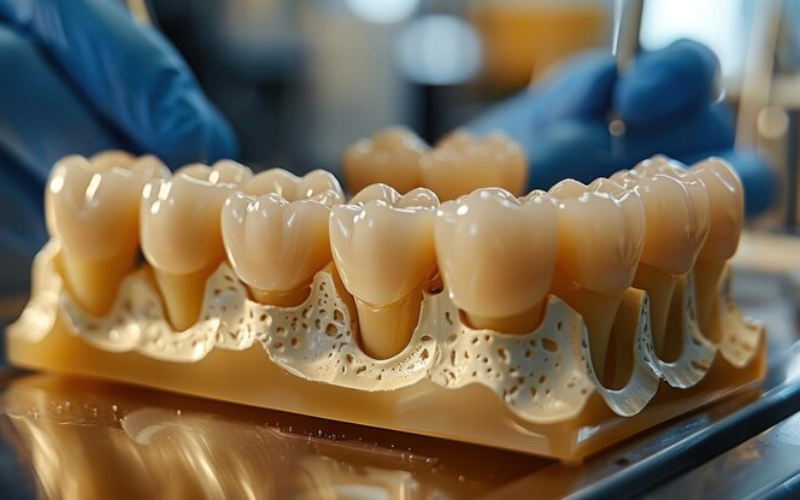1101-116 Grande Blvd, Cochrane, Alberta, T4C 2G4
How Dental Crowns Can Save Your Damaged Teeth?

Dental crowns are one of the most effective solutions in restorative dentistry for patients dealing with damaged teeth. These custom-made caps not only restore the functionality of a tooth but also enhance its appearance, ensuring that you can smile confidently.
In this blog, we will explore what dental crowns are, their various types, the process of getting them, their benefits, and essential care tips to ensure their longevity.
Dental Crown: An Overview
A dentist places a dental crown, a tooth-shaped cap, over a damaged tooth to restore its shape, size, strength, and appearance. They use crowns when a tooth is weakened, cracked, or has experienced significant decay.
Dentists often use crowns after procedures like root canals or as part of a dental bridge to fill gaps created by missing teeth.
Types of Dental Crowns
There are several types of dental crowns, each with distinct advantages:
- Porcelain Crowns: These crowns are aesthetically pleasing and closely resemble natural teeth, making them ideal for front teeth. They are durable but may not be as strong as metal crowns.
- Metal Crowns: Made from alloys or gold, these crowns are highly durable and resistant to wear, making them suitable for back teeth where the pressure from chewing is greatest. However, their metallic appearance may not be aesthetically pleasing for visible teeth.
- Ceramic Crowns: These crowns are made from a combination of porcelain and other materials, offering a good balance between aesthetics and strength. They are a popular choice for front teeth.
- Resin Crowns: Typically less expensive than other types, resin crowns are also less durable and are generally used as a temporary solution.
Why Are Dental Crowns Necessary?
Dental crowns serve various essential functions in dental care:
1. Restoration of Functionality
When a tooth is damaged or decayed, it may lose its ability to function correctly. Crowns restore chewing capability, allowing you to eat your favorite foods without discomfort.
2. Protection of Weak Teeth
Teeth that have undergone root canal therapy or are severely worn down are at risk of breaking. Crowns provide a protective covering, preventing further damage and prolonging the life of the tooth.
3. Aesthetic Improvement
Crowns can enhance the appearance of discolored, misshapen, or damaged teeth. This improvement can significantly boost self-esteem and confidence.
4. Support for Bridges
Crowns are often used to anchor dental bridges, helping to fill gaps caused by missing teeth. They provide stability and a natural look to dental restorations.
5. Prevention of Dental Issues In Near Future
By covering damaged teeth, crowns help prevent further decay or complications, reducing the likelihood of needing more extensive dental work in the future.
The Process of Getting a Dental Crown
Getting a dental crown typically involves a series of steps, which can vary depending on the specific case and the type of crown being placed.
Step 1: Initial Consultation
During your first visit, the dentist will:
- Conduct a thorough examination of your teeth and gums.
- Take X-rays to assess the health of the affected tooth.
- Discuss your treatment options, including the type of crown best suited for your needs.
Step 2: Tooth Preparation
If the dentist determines a crown is necessary, they will prepare your tooth:
- Shaping the Tooth: The dentist removes the damaged portion and reshapes the tooth to ensure the crown fits comfortably.
- Taking Impressions: The dentist takes a mold of your prepared tooth to create a custom crown, ensuring a perfect fit.
Step 3: Temporary Crown Placement
While the lab fabricates your permanent crown (usually taking a few weeks), the dentist places a temporary crown to protect the prepared tooth and maintain its function.
Step 4: Final Crown Placement
Once your permanent crown is ready:
- The dentist will remove the temporary crown.
- The dentist carefully places the permanent crown and checks its fit, color, and bite alignment before permanently cementing it.
Step 5: Follow-Up Care
Your dentist may schedule a follow-up appointment to ensure the crown is functioning properly and that there are no complications.
Advantages of Dental Crowns
Dental crowns come with numerous advantages, making them a popular choice among both dentists and patients:
- Durability: Crowns can last 10 to 15 years or longer with proper care, making them a long-term solution for tooth damage.
- Natural Appearance: Modern dental crowns can closely mimic the look of natural teeth, providing aesthetic benefits alongside functionality.
- Improved Oral Health: By restoring and protecting damaged teeth, crowns can help maintain overall oral health and prevent further complications.
- Versatility: Dentists use crowns to address various dental issues, including decay, fractures, and as part of larger restorative procedures.
- Boost in Confidence: A beautiful, functional smile can significantly enhance self-esteem and social interactions.
Care for Your Dental Crown
Proper care is essential to ensure the longevity of your dental crown. Here are some tips to maintain your crown and overall dental health:
- Maintain Good Oral Hygiene: Brush your teeth twice daily and floss regularly, paying special attention to the area around the crown to prevent plaque buildup.
- Avoid Hard Foods: Chewing on hard candies, ice, or other hard objects can damage the crown. Be mindful of your diet, especially during the initial period after placement.
- Regular Dental Check-Ups: Schedule routine visits to your dentist for cleanings and examinations to monitor the health of your crown and surrounding teeth.
- Consider a Nightguard: If you grind your teeth at night, discuss the option of a nightguard with your dentist. This can protect your crown from excessive wear and pressure.
Dental crowns are a valuable option for preserving and restoring damaged teeth, offering both functional and aesthetic benefits. They can protect weak teeth, enhance your smile, and prevent further dental issues.
If you have damaged or compromised teeth, consult your dentist about how dental crowns can save your smile and improve your quality of life. Taking proactive steps toward your oral health today can lead to a brighter, healthier future.



